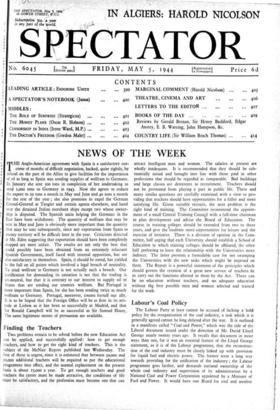Finding the Teachers
Two problems remain to be solved before the new Education Act can be applied, and successfully applied: how to get enough teachers, and how to get the right kind of teachers. This is the subject of the McNair Report published last Wednesday. The first of these is urgent, since it is estimated that between 50,000 and 90,000 additional teachers will be required to put the educational programme into effect, and the normal replacement on the present basis is about 15,000 a year. To get enough teachers and good teachers the career must be made attractive, the conditions of life must be satisfactory, and the profession must become one that can
attract intelligent men and women. The salaries at present are wholly inadequate. It is recommended that they should be sub-
stantially raised and brought into line with those paid in other professions that should be regarded as comparable. Bad buildings and large classes are deterrents to recruitment. Teachers should
not be prevented from playing a part in public life. These and many similar questions are carefully examined with a view to pro- viding that teachers should have opportunities for a fuller and more satisfying life. Given suitable recruits, the next problem is the right kind of training. The Committee recommend the appoint- ment of a small Central Training Council with a full-time chairman to plan development and advise the Board of Education. The course in training iolleges should be extended from two to three years, and give the students more opportunities for leisure and the exercise of initiative. There is a division of opinion in the Com- mittee, half urging that each University should establish a School of Education to which training colleges should be affiliated, the other half preferring to leave the relationship with the Universities more indirect. The latter presents a formidable case for not swamping the Universities with the new tasks which might be imposed on them. The Report is a powerful statement of the principles which should govern the creation of a great new service of teachers fit to carry out the functions allotted to them by the Act. There can be no education without teachers, and no adequate education without di; best possible men and women selected and trained for the work.






















